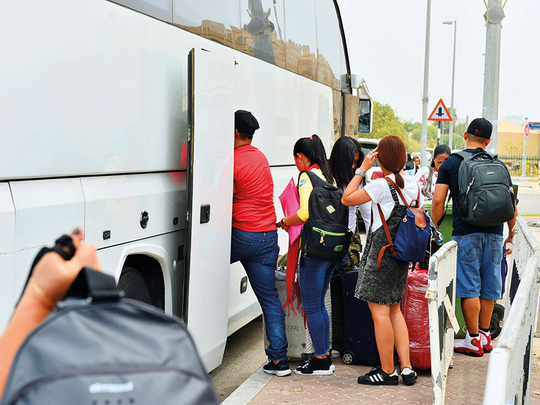
Abu Dhabi: A total of 128 Filipinos who availed of the amnesty granted by the UAE Government returned to the Philippines on Tuesday evening, a Filipino diplomat told Gulf News.
“This is the first mass repatriation of amnesty-seekers carried out by the Philippine Embassy in Abu Dhabi since the amnesty started on August 1,” said Von Ryan G. Pangwi, third secretary and vice-consul at the embassy.
The Philippine government is offering free air tickets to amnesty-seekers going back home, he said. The embassy is issuing the emergency certificate (EC) for free.
Amnesty-seekers who do not have a valid passport have to get an EC from their respective embassies before approaching amnesty centres.
The embassy blocks tickets for Filipino amnesty-seekers on Philippine Airlines, depending on the seat availability, and arranges their travel accordingly, the diplomat said.
Around 2,000 Filipino amnesty-seekers approached the embassy since August 1 and 128 ECs (for those who travelled on Tuesday) were issued. The remaining applications are under process, Pangwi said.
“It takes two to three weeks to issue an emergency certificate,” he said.
Of the 128 people who left, 30 per cent were men and the rest women, the official said.
They all gathered at the embassy by afternoon and boarded three buses arranged by the embassy, which took them to the airport. The flight was scheduled at 7.30pm.
When Gulf News approached some of them for their comments, they said they did not want to speak to the media for reasons of privacy.
Pangwi said most of the amnesty-seekers had landed in the UAE on visit or tourist visas and eventually overstayed.
There were many who came from a third country to work as domestic workers. Since the Philippines has halted the deployment of Filipino domestic workers in the UAE, immigration officials now prevent such job aspirants from leaving the Philippines. That is why some of them enter the UAE by travelling through a third country, Pangwi said.
Negotiations between the UAE and Philippines on the issue of domestic workers’ deployment are progressing, the official added.
He said the Philippine government has an established system to protect its citizens working abroad. It is easy for the embassy to extend its support to those who follow legal channels. “That’s why we urge our citizens to abide by the rules and regulations.” However, he said, the embassy always tries to help everyone, irrespective of their legal status.
As Gulf News reported on August 16, around 100 Filipino amnesty-seekers, including six minors, were repatriated from Dubai on August 15 in the first such mass repatriation carried out by the Philippine government from the UAE.
90% of Filipino amnesty-seekers want to stay in UAE
About 90 per cent of Filipino amnesty-seekers in Abu Dhabi want to stay back and work in the UAE, a diplomat told Gulf News.
“Most of them want to apply for the six-month visa for amnesty-seekers [that enables them to search for a job],” said Von Ryan G. Pangwi, third secretary and vice-consul at the Philippine Embassy in Abu Dhabi.
He said the embassy is expediting issuance of passports to those who do not have a valid passport so that they can apply for the six-month visa at the earliest.
“We thank the UAE Government for giving amnesty-seekers this opportunity to regularise their status,” Pangwi said.
Amnesty-seekers who have a valid passport can directly approach Tasheel centres to apply for a new job visa or six-month visa, he said.
Such amnesty-seekers should contact Amer centres if they live in Dubai.
As Gulf News reported on Monday, those with lost passports can also try and regularise their status.
They have to first approach the amnesty centre to get a report on the lost passport and then approach their respective embassies and apply for a new passport.








